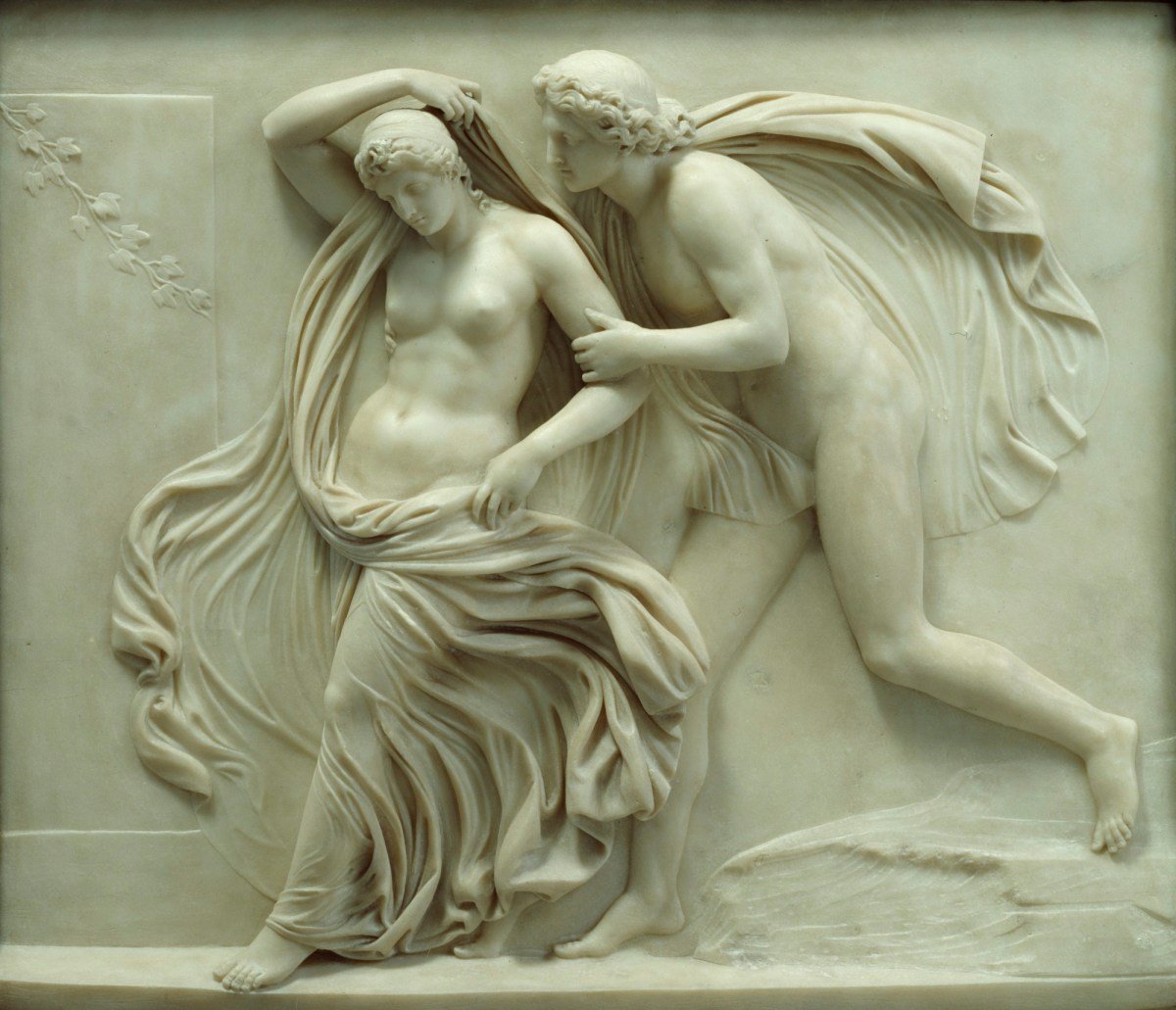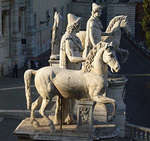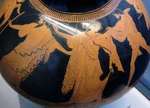
Idas and Marpessa
The story of Idas and Marpessa may not be as famous as the stories of Eros and Psyche or Adonis and Aphrodite, but it is undoubtedly as beautiful and as romantic. It certainly has all the necessary elements: an exceptionally beautiful maiden wanted by many, a cruel father unwilling to give her hand to nobody, and a handsome hero ready to risk his life to win it. And that’s merely the first part of the story; the second one is even more tender. Read ahead and discover why.
Winning Marpessa from Evenus
The “Marry-or-Die” Chariot Race
Marpessa was the daughter of Alcippe and Evenus, the king of Aetolia. Often described as a “fair-ankled maid,” Marpessa was widely considered one of the most beautiful women to ever walk the earth. However, in addition to a number of suitors, Marpessa also had the misfortune of having a very strict and conservative father. Determined to keep Marpessa’s innocence untouched for as long as he lives, Evenus challenged each and every one of her suitors to a deadly chariot race. He promised to give the hand of his daughter to the one who would beat him; nobody came even close. It was rumored that Evenus kept the heads of his vanquished opponents nailed to the walls of his house – as a warning to both his daughter and to any future suitor wishing to marry her.
The Final Suitor: Idas
One day, Idas, the prince of Messenia, came to Aetolia to woo Marpessa. Even though everybody knew him to be one of the two sons of Messenia’s king Aphareus, Idas was, in fact, a demigod, born nine months after Arene, Aphareus’ wife, had unknowingly slept with the disguised Poseidon. According to Homer, he was “the mightiest of men that were then upon the face of the earth;” according to other authors, he also owned a golden chariot drawn by winged horses, given to him once by his real father. So, unsurprisingly, Evenus stood no chance against Idas and, for once, he convincingly lost his own chariot race.
Fleeing with Marpessa
However, Evenus refused to keep his word and declined to give his daughter’s hand in marriage to Idas. “Sparing your life,” he said to him, “is enough of a reward for your victory.” Idas thought otherwise: in the blink of an eye, he grabbed Marpessa and, not against her will, carried her off on his winged chariot. Evenus gave chase, but he and his mortal horses were no match for Idas and his divine chariot. So, when he came to the river Lycormas, humiliated and in utter dismay, he slaughtered his horses and threw himself into the river. The river was renamed Evenus after him, and it bears that name to this very day.
The Contest with Apollo
A Rift with Apollo
Idas took Marpessa to his home country of Messenia, in the southwestern part of Peloponnese. There, out of nowhere, the god Apollo appeared and attempted to steal Marpessa for himself; for such was her beauty that even the Olympian couldn’t resist her. However, upon seeing this, Idas courageously drew his bow, ready to fight with the god if that was necessary to finally earn the hand of his beloved. Who knows what would have happened next if Zeus hadn’t intervened, parting Apollo and Idas and suggesting a Solomonic solution to their problem.
Marpessa’s Decision
Namely, it was Marpessa the one who should choose who of the two men fighting for her hand would be her husband. To the surprise of both gods, Marpessa chose Idas. Some say that she made this decision because she realized that, for all his supernatural beauty, Apollo was still just an ageless god who’d probably stop loving her as soon as her wrinkles appear. On the other hand, Idas clearly loved her more than his own life for he had risked it twice to get her in the span of a single day; and, moreover, he looked like someone who’d want to grow old with her. Others think that the story is even more romantic. They say that Marpessa fell in love with Idas the minute she laid her eyes upon him in Aetolia, and not even the temptation of becoming an immortal goddess married to the most beautiful god on Olympus managed to thwart her tender feelings.
The Later Life of Idas and Marpessa
A Match Made in Heaven
Be that as it may, Marpessa never regretted her decision. She lived a peaceful and content life with her husband in Messenia for many years to come. Soon, a daughter was born to the happy couple. They named her Alcyone after the Ancient Greek word for the kingfisher, a brightly colored bird with a plaintive cry; supposedly, this was done in memory of the sorrowful weeping of Marpessa as she was being dragged by Apollo. In the Iliad, while telling the story of this girl’s eventual husband, Meleager, Phoenix says that her name was, in fact, Cleopatra; however, not many others would agree with this claim.
The Deaths of Idas and Marpessa
Unfortunately, sometime later, Idas and his brother Lynceus got into a rift with their allies, the Dioscuri, over the division of some war spoils. The conflict erupted, and before too long – after Lynceus had noticed the Dioscuri planning an ambush – Idas murdered Castor. Pollux avenged his death by killing Lynceus, after which Idas threw a stone at Pollux and murdered him too. Zeus didn’t accept the death of his son lightly: he smote Idas with a thunderbolt, killing him on the spot. Upon finding out about the death of her husband, the despairing Marpessa killed herself from grief.
Idas and Marpessa Sources
Apollodorus retells the tale of Idas and Marpessa in the Library, where you can also find the story of Idas’ death. Additionally, the former one is alluded to briefly in the ninth book of Homer’s Iliad.
See Also: Apollo, Idas, Dioscuri, Castor, Pollux
Idas and Marpessa Video
Link/Cite Idas and Marpessa Page
Written by: The Editors of GreekMythology.com. GreekMythology.com editors write, review and revise subject areas in which they have extensive knowledge based on their working experience or advanced studies.
For MLA style citation use: GreekMythology.com, The Editors of Website. "Idas and Marpessa". GreekMythology.com Website, 07 Dec. 2018, https://www.greekmythology.com/Myths/The_Myths/Idas_and_Marpessa/idas_and_marpessa.html. Accessed 18 April 2024.



